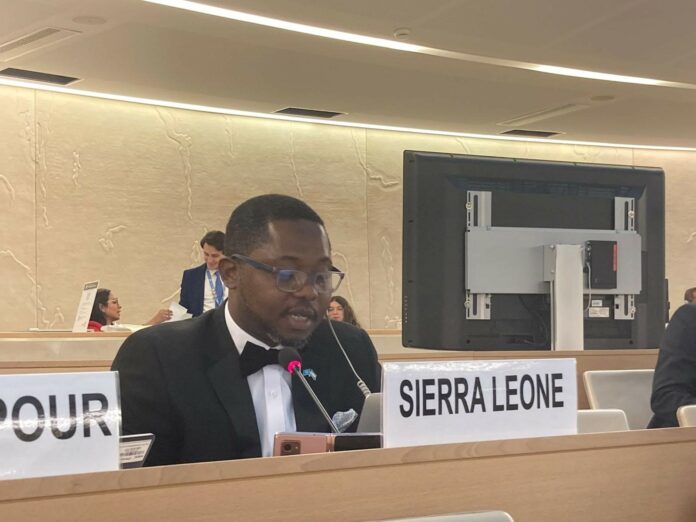
By Alhaji Haruna Sani
Ambassador Samuel UB Saffa, Sierra Leone’s Deputy Permanent Representative to the United Nations Mission in Geneva, last week spearheaded an open-ended intergovernmental working group focused on the rights of early childhood education.
The initiative underscores Sierra Leone’s commitment to human capital development despite its economic challenges.
Ambassador Saffa introduced the resolution on behalf of the Ambassadors of the Grand Duchy of Luxembourg and the Dominican Republic, who are the main sponsors and co-sponsors of the resolution.
The adoption of the resolution will establish an intergovernmental working group and its mandate will be to explore the possibility of drafting a Fourth Optional Protocol to the Convention on the Rights of the Child, explicitly recognising that the right to education includes free early childhood care and education from pre-primary to secondary levels.
The adoption of the resolution follows extensive consultations by the Core Group with all stakeholders, including informal sessions, during the 56th regular session of the Human Rights Council.
The establishment of this Working Group is a critical step forward in our ongoing commitment to ensure that every child, regardless of their background or circumstances, has access to the educational opportunities they deserve.
Guided by the purposes and principles of the United Nations Charter, and reaffirming the human right to education enshrined in documents such as the Universal Declaration of Human Rights, the International Covenant on Economic, Social and Cultural Rights, and the Convention on the Rights of the Child is initiative aims to make significant strides in ensuring educational opportunities for all children.
The nearly universal ratification of the Convention on the Rights of the Child has prompted states to commit to making primary education compulsory and free for all, as well as encouraging the development of secondary education.
Ambassador Saffa highlighted that Sierra Leone’s leadership in this initiative reflects a strong political will and a shared vision for education.
“Despite the size of our economy and the economic challenges we face, we have chosen to pursue this initiative with unwavering determination because of our firm belief in the importance of human capital development,” Saffa stated.
He emphasized the legal obligation of states to provide primary education and the commitment to making pre-primary and secondary education free, as outlined in the Sustainable Development Goals (SDGs).
Saffa pointed out that Sierra Leone is committed to ensuring free quality education for all levels, from pre-primary to secondary, by 2030.
The resolution is a step forward in the government’s ongoing commitment to ensuring that every child, regardless of their background, has access to the educational opportunities they deserve.
He said according to UNICEF, only 45% of children worldwide complete secondary education, and almost half of the world’s children are missing out on pre-primary education, with more than 175 million preschool children not enrolled. This statistic calls for urgent action.
Saffa noted that the cost of education remains a principal barrier preventing children from attending school. He mentioned that the core group, along with resilient civil society partners, consulted extensively with academics, UN experts, and member states. Through regional group engagement, they concluded that a fourth optional protocol to the Convention on the Rights of the Child is the best way for willing states to commit to providing free education for every child.
The three previous optional protocols to the Convention on the Rights of the Child have been highly ratified and have accelerated positive change. Prior to tabling the resolution, the core group engaged constructively with all delegations at four informal meetings, resulting in a strengthened resolution.
The final revised text proposes an open-ended intergovernmental working group with a clear mandate to explore drafting the aforementioned optional protocols and submitting them to the council.
Ambassador Saffa underscored that the presented text is the result of a constructive, wide-ranging, transparent, and inclusive negotiating process. He concluded by quoting the late Sierra Leonean trade unionist IT Wallace Johnson, saying, “There is only one way out of our difficulties, and that is to organize a move.”
He emphasized that with this first step, the council is positioned to guarantee and secure the future of the next generation. “We must either fulfill that responsibility or betray it. If we betray it, we risk being on the wrong side of history, but if we fulfill it by adopting the resolution by consensus, we would be laying a solid foundation for generations yet unborn.”




